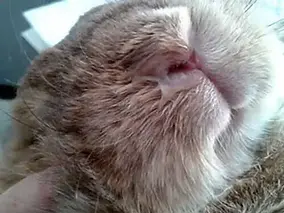Common Illnesses
There are a few common illnesses which rabbits can get they include:
1. Pasteurella (Snuffles)
Pasteurella is generally characterised by the presence of nasal discharge, watery eyes, matted paws and sneezing. It is caused by Pasturella multocida bacteria, this illness tends to manifest itself during or after stressful situations, so in addition to feeding rabbits a healthy diet and maintaining a clean rabbitry, prevention can include minimizing stress for your rabbits.
For affected individuals, treatment with antibiotics is sometimes recommended, though the efficacy is not guaranteed, as is often the case with chronic infections, where the bacteria have become entrenched in the rabbit’s bodily systems. More advanced forms of the disease might be treated with other medications or surgery. Snuffles can be easily transmitted from one rabbit to another; therefore, isolation of the infected rabbits is imperative to stop the spread of the illness.
In extreme or chronic cases, nebulisation is recommended. If you would like any advice on this please do get in touch.
2. Sore Hocks
Although most commonly seen in large or giant rabbit breeds, sore hocks can be problematic for any rabbit breed housed in less-than-sanitary conditions or kept in a hutch with a wire floor. Sore hocks is an infected ulceration of the foot pad, often caused by prolonged pressure of the rabbit’s feet against the cage floor. The problem can be prevented by providing floor mats, resting boards or nest boxes so that your rabbits have a comfortable place to rest. Additionally, toenails should be clipped short and hutches should be kept clean. Treatment for sore hocks can include antibiotics or anti-inflammatory medications, but you can consult a veterinarian about the possible use of foot wraps, calamine lotion or ointments, such as Neosporin or Preparation H.
3. Ear Mites
If you find a crusty, scabby substance on the inside of your rabbit’s ears, this is ear canker and is caused by ear mites. Other symptoms can include head shaking and intense scratching; hair loss is also occasionally seen. Ivermectin is a common treatment option, so ask your veterinarian for advice regarding dosage and frequency of treatment. Mineral oil—a drop or two in each ear, once a month—is an option for preventing an infestation of ear mites. An underlying infection may often accompany ear-mite symptoms, so always consult your rabbit-savvy veterinarian about treatment.
4. Heat Stroke
Heat stroke is a dangerous problem for rabbits, particularly those housed outdoors. Rabbits are extremely sensitive to elevated temperatures, and your outdoor rabbits will need ample protection in order to stay sufficiently cool during periods of hot weather. Protection from the sun, of course, is paramount, but so is continual access to fresh air and water . You can provide frozen water bottles for rabbits to lay next to and absorb the cold on hot days and a fan blowing near (but not directly on) your rabbits to help circulate cool, fresh air. By keeping your rabbits cool and comfortable, you’ll help prevent heat-induced illnesses. For a rabbit suffering from heat stroke, an immediate reduction in body temperature is necessary. Spray the rabbit with tepid water and immediately transport it to a veterinarian, who may need to treat the rabbit with IV fluids.
5. GI Stasis
Essentially a slowdown or stoppage of the digestive tract, gastrointestinal stasis is a dangerous and often fatal illness. Signs can include the failure to produce fecal droppings, a lack of appetite, failure to drink, a bloated abdomen and general listlessness. If your rabbit exhibits these symptoms, it should be immediately evaluated by a veterinarian. A range of treatment options for G.I. stasis includes surgery, oral fluids, free-choice hay, abdominal massage, and simethicone drops or tablets. The course of treatment will depend on whether an intestinal blockage is involved.
Prevention of G.I. stasis in your rabbits is ideal. Providing a diet high in fiber—including plenty of hay and a high-fiber pelleted feed—along with an unlimited supply of fresh water will go a log way to prevent this illness. Fresh greens can also be a beneficial addition to your rabbit’s diet, but introduce these slowly in order to avoid enteritis, an intestinal inflammation that causes diarrhea.
There are, of course, many other illnesses that can affect rabbits—mastitis, hutch burn, wry neck and coccidiosis, among others. It’s wise to acquaint yourself with the symptoms of a wide range of rabbit illnesses. By learning to recognize the symptoms of an unhealthy rabbit (lack of appetite, dull fur or fur loss, lethargy, increased respiration, teeth grinding, diarrhea, et cetera), you’ll be able to detect problems quickly and begin treatment immediately, giving your rabbits the best chance for recovery and a healthy, happy future.
6. E.Cuniculi
E.Cuniculi (Encephalitozoon Cuniculi) is a parasite that lives in the rabbit's body cells. It is estimated that over 50% of domestic rabbits carry this parasite but only a small percentage of these go on to develop problems. It is a relatively rare but seriously debilitating disease which all rabbit owners should be aware of.
Symptoms:
- convulsions or fits
- tremors
- head tilt
- loss of balance
- blindness
- partial paralysis
- coma or even death
Prevention / Treatment
Many vets are now recommending a worming treatment called Panacur. Dependent on opinion, a one-off course of 28 days is usually sufficient although some recommend that this be administered four times a year to prevent reinfection. You should also be prescribed an antibiotic and also an anti-inflammatory.
Panacur can also be used as treatment to rid the rabbit of the parasite after symptoms appear, however, it is not a treatment for the results of E. Cuniculi i.e. if your rabbit has already suffered these symptoms it will not "cure" the rabbit. Depending on severity of symptoms, some rabbits can be nursed back to health but may be left with a permanent disability such as a head tilt.
We have had a quite a lot of experience with different rabbit illnesses, so if you ever need advice please contact us.






